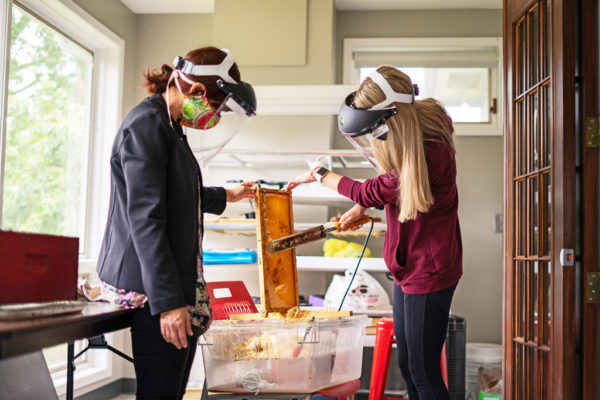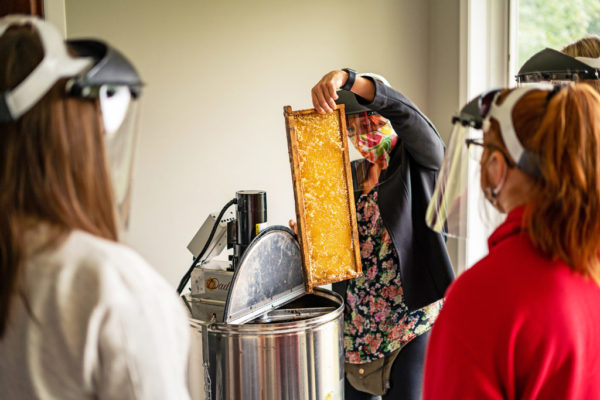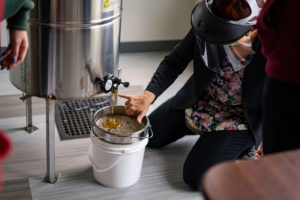
Students harvest honey during The Buzz Around Bees, an honors class at Central.
Bridge, board games and bees — oh, my! These are just a few of the honors topics students could select for the Fall 2020 or Spring 2021 semesters. But what’s honorable about courses that sound so … fun?
THE HONORS QUEST: Earn the academic trifecta by achieving three goals.
THE GOALS: Exercise extreme creativity, foster intellectual engagement and develop unparalleled leadership — the trifecta of the academia realm.
HOW TO CONQUER THE HONORS QUEST: Complete a mind-opening honors course at Central College.
Honors courses at Central may not actually be structured like levels in a video game, but unique topics paired with a traditional interdisciplinary approach make learning fun! The lofty goals of an honors course, outlined above, balance excitement and depth for a truly mind-opening learning experience.
Consider the Course
Honors courses expose students to subjects and ideas they may not get to experience as part of their major. “Honors seminars are offered each semester,” says Leslie Keuning Duinink ’90, registrar and class dean. “Though there are some standard courses offered for a few consecutive years, the majority of the classes change frequently.” Five honors courses were offered in Fall 2020, and four are open for Spring 2021 (see courses below).

In the honors course The Buzz Around Bees, students explore the diversity of bees in the world. They also get the opportunity to extract honey into a pure liquid form.
Wildlife Central
In the honors course The Buzz Around Bees, taught by Paulina Mena, associate professor of biology, students explore the diversity of bees, both native and introduced, in the wild and in apiculture. This strategy gives students an all-encompassing knowledge of the pollinators, including the biology of bees; their ecology and conservation; culture for honey production and pollination of crops; and bees’ role in society through history. But why are those topics important?
“Pollinators are responsible for one of every three bites of food we eat,” Mena says. “Furthermore, they are responsible for the reproduction of many of our native plants.”
Other species in an ecosystem largely depend on pollinators, making them a keystone group of species.
“If they were removed, the ecosystem would change drastically,” Mena says. “That’s why we need to increase awareness and conservation efforts to have healthy bee populations.”
“It is one thing to learn about bees in a classroom. It is a whole new experience to actually hear the buzz of the hive and see all the action within.”
— Jenna-Marie Hernandez ’24
Hands-on, Honey
Mena’s hands-on class gives students the opportunity to experience bee cultures more frequently than sitting through lectures.
“We had field trips to collect native bees; we visited the hive; we harvested honey, bottled and labeled the harvest,” Mena says.
Harvesting honey was a small portion of activities Central students participated in, because the honeybee is one of many species focused on during the course. Though the honeybee is a great example to learn about bees in general, the class readings focused primarily on native bees.
“Native bees are much more important as pollinators and should be the focus of conservation efforts,” Mena says. “The class also deals with the more than 20,000 natives bees, 400 of which live in the state of Iowa.”
“I enjoyed getting to harvest the honey. It was crazy to see the different layers of the comb, and awesome to watch the wax fall down the comb as honey came into view. I had never seen pure honey with the fun, natural stuff still in it. This might have been one of the coolest experiences of my life!”
— Katelyn Fields ’24

Buzzworthy
The Buzz Around Bees covers issues bees are facing and practices to help conserve them, including everything from policy changes to small things everybody can do. During the course, students learn Central is a certified Bee Campus USA, which recognizes educational campuses that commit to a set of practices that support pollinators, including bees, butterflies, birds, bats and more. Students learn in the class that Central was the first college in Iowa to earn the designation in May 2018, and was the sole Iowa college to earn this distinction until earlier this year.
The Bottom Line
“These honors classes are so much fun,” Mena says. “I wish I could take some of the ones that are offered!”
Fall 2020 Honors Courses
Bridge: Game of Games
Bridge is a card game focused on cooperation and communication and has been described as the ultimate in intellectual competition. This course, taught by Professor of Biology Anya Butt, gives students the opportunity to learn the game and understand the impact of bridge in modern societies.
 The Buzz Around Bees
The Buzz Around Bees
Taught by Associate Professor of Biology Paulina Mena. See above.
An Examination of Color
In this course, Professor of Chemistry James Shriver educates students about the basic science behind color before delving into the history and sources of a variety of colors from across the palette.
Hugo’s Les Mis in U.S. Pop Culture
The cultural legacy of Les Misérables — and how it has managed to fascinate popular cultural consciousness for so long — is the core of this course taught by Professor of French Nicole Kaplan.
Sports Analytics: Soccer
Students investigate the role data analysis plays in the athletics world, in this research-based class instructed by Professor of Mathematics Russ Goodman and Lecturer of Exercise Science Katelin Valster.
Spring 2021 Honors Courses
Board in Class: Survey/Board Game
This course is an interdisciplinary seminar taught by Associate Professor of Chemistry Jay Wackerly in which technical, cultural and artistic aspects of modern board games will be presented and experienced.
Love and Polygamy: Culture/Law/ Media
Using a case study approach under the direction of Associate Professor of Communication Studies Shelley Bradfield, students will explore how culture, law and health issues intersect through television shows from South Africa and the United States that center on the lives of polygamist families.
Mars: Exploring the Possibilities
From its very earliest discovery, Mars has intrigued humanity. In this course taught by Professor of Biology Anya Butt, students will explore what is known about the planet, what the realities of Martian exploration are and what it would take to colonize Mars.
What’s Opera, Doc?
Students will be given the opportunity to appreciate and understand how classical music maintains an important place in our day-to-day lives by exploring how opera pervades pop culture with Lecturer of Music Sean Stephenson.












To encourage serious, intellectual discourse on Civitas, please include your first and last name when commenting. Anonymous comments will be removed.
Comments are closed.